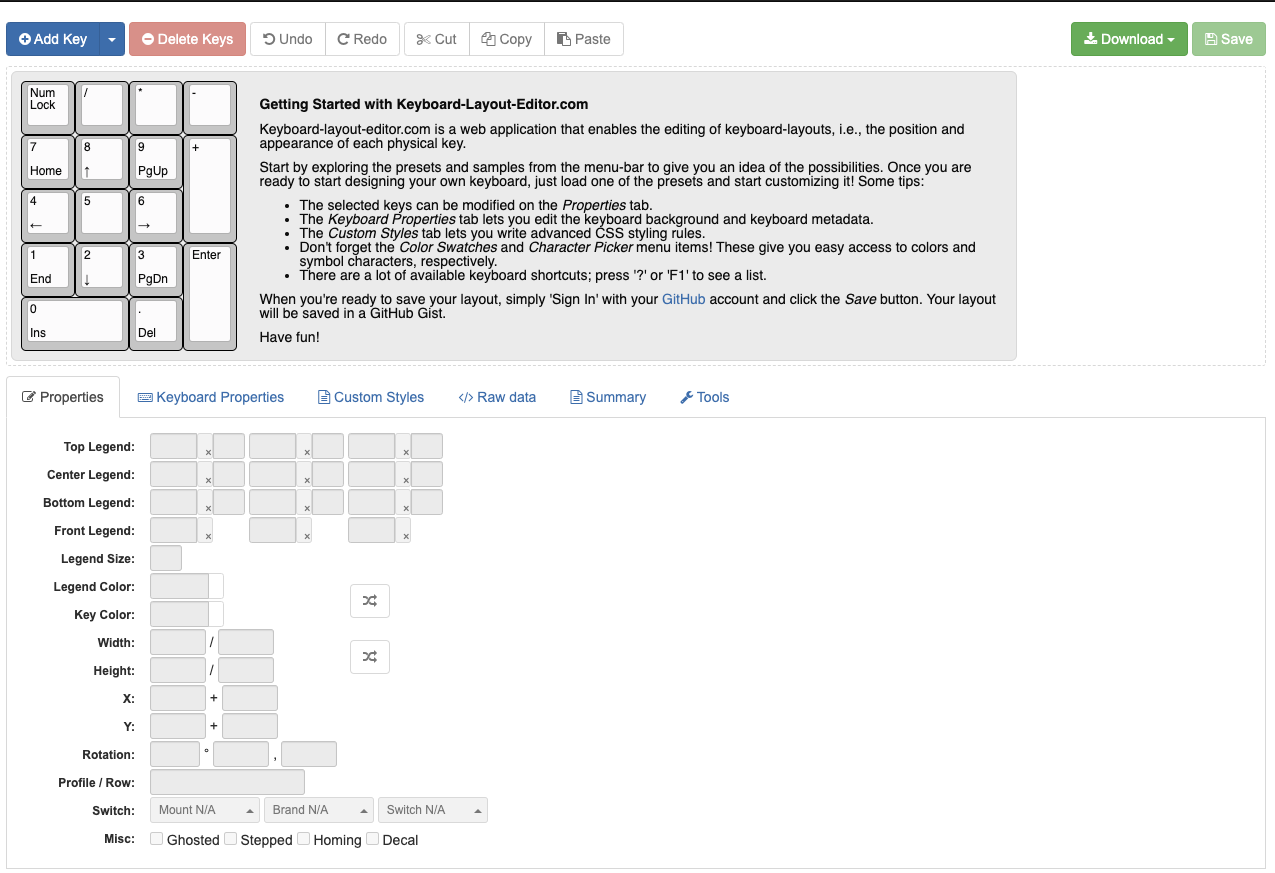Work
KLE.json, KLE.js, KLE.py
Audience: Open Source
Service: Library Development
Sector: Technology
Year: 2021
kle-json •
kle-js •
kle-py
Programming libraries and utilities to edit and preview keyboard layout editor (KLE) files.
Background
Keyboard layout editor,by ipjrest or KLE for short, is a digital tool used as starting point for prototyping keyboard layout designs in the process of custom keyboard design and manufacturing. It's responsible for creating the layouts of many popular keyboards on the mechanical keyboard subreddit including boards such as the Prime Elise, Bauer, and many more.

The layout prototype is then used to create plate, pcb, and case drawings which are all taken to manufacturers for production. Aside from the physical designs, keyboards also have to be progrmamed and may store the KLE JSON (or some modified form) to represent the layout of the keys. Files also need to be generated across a swath of different keyboard control software platforms such as QMK, VIA, VIAL to allow custom keyboard users to remap keys to different key codes, shortcuts, or even macros.
You can read more about the creation process of custom keyboards from Matt3o.
The Problems
When I first started the project, KLE was old, and with ipjrest, the original author and maintainer, becoming increasingly inactive, it needed a revamp. I envisioned features that KLE had not yet implemented such as collision checking, plate generation, PCB generation, and even 3D previews with configuration options available to keyboard designers. Not only could new potential features help keyboard designers with the design, it could even help them on the programming side as well, especially when that programming involves embedded systems. There was the potential to add tools to automatically generate.
This KLE project was the first part of a greater platform I intended to build. The goal of this project was to be able to parse KLE information and provide backwards compatiblity with a format that was already well-known by the keyboard designer community before continuing development with my new platform.
However, KLE as it was, was very difficult to work with. I spent weeks reading through the original KLE source code to understand how KLE stored information about individual keys. The KLE JSON format which stored data about the keys in a file was designed be memory optimized such that it could be stored with micro controller units for the keyboard which were very limited in size. Each key in the KLE JSON format was stored as a set of changes recorded against the previous key in sequence, meaning that each key could not be individually represented as the it was and this was the source of difficulty in interacting with KLE. Parsing and serializing KLE information was not simple or customizable at all.
One Big Refactor to Solve it All
Rewriting the KLE source code for parsing and serializing the KLE JSON format was also quite the chore and learning exercise. The original source was not written in a way that was modular or easily readable - I suspect there was difficulty in getting contributions from open source to help fix bugs and add features because of this issue.
These were all problems that I tackled in rewriting my own version of the KLE libraries that could be more easily understood & distributed. As a big supporter of building great developer experiences I made sure that the libraries were modular & easily comprehendable, capable of validating the KLE data & file, and provided object relational models. In-line documentation would help developers understand the properties of the individuals keys they worked with and unit tests would provide quality assurance. A documentation website was also deployed so that developers could use it a reference and my libraries were distributed to the package indexes (PYPI & NPM) so other developers could easily include my libraries in their own projects. All these small little things that were added in refactoring KLE set up my KLE libraries for long-term maintenance.
For the Sake of the Bigger Picture
The goal of this project was not to build a new platform (we'll leave this for another time), it was to refactor KLE in a way that would make it easier to use in future projects and give other developers (including myself) the tools needed to make interacting with KLE JSON files easier than it already had been in the past. With proper modularization, validation, testing, documentation, and distributed packaging that made KLE tools easier to install, I hoped that what I created would make developer experiences comfortable enough to encourage open source contributions to these libraries or even any projects that decided to include my libraries in the future.
In a niche space such as designing custom keyboards, I wanted to push the envelope in developer experiences a little further along the line.
ACPatterns.js
Dev Tools, Open Source
Animal Crossing Pattern Tool
Web App, Open Source